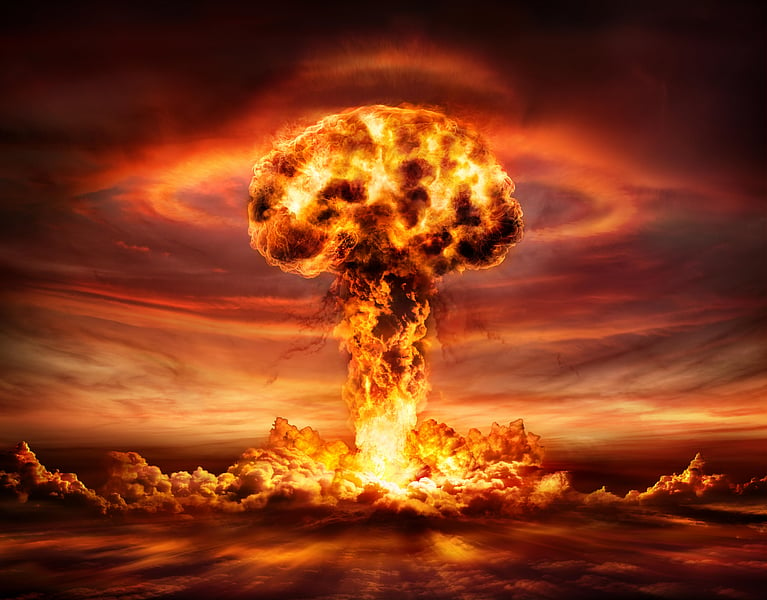Get Healthy!

- Amy Norton
- Posted August 10, 2022
U.S.-Russia Nuclear War Could Leave 5 Billion Dead Due to Famine
Even a "small" nuclear war, far short of a global conflict, could kill much of the world's population due to starvation, a new study projects.
Any nuclear war would have obviously devastating effects in the places where it was waged -- obliterating cities, instantly killing huge numbers of people, and contaminating local soil and water.
But the destruction would be expected to stretch far beyond those borders: It's believed the massive fires ignited by bomb blasts would launch soot high into the atmosphere, blocking sunlight and causing temperatures to plunge -- a concept called nuclear winter.
It would be akin to instant climate change, said Alan Robock, one of the researchers on the new study.
The effects on crops, fish and livestock worldwide could be catastrophic, but the extent would depend on how much soot is injected into the atmosphere.
So for the new study, Robock's team used computer simulations of six nuclear war scenarios. They estimated the impact of each on crops, wild fish and other food sources -- and ultimately, the number of human lives lost to famine.
"The direct impact of nuclear war is devastating," said Robock, a professor of environmental sciences at Rutgers University in New Brunswick, N.J. "Our work is looking at what would happen to the rest of the world."
The researchers calculate that even a one-week regional war -- between India and Pakistan, as an example -- could kill more than 2 billion people worldwide. And while the bombs could instantly kill millions, the bulk of those deaths would actually happen in the following two years, due to starvation.
The greatest toll, though, would come from a wide-scale nuclear war between Russia and the United States and its allies. That, the study projects, could kill upwards of 5 billion people -- again, largely from famine.
"No one has done this calculation before," Robock said. "No one has tried to calculate the numbers of people who would die."
As it stands, nine countries have nuclear arsenals: the United States, Russia, the United Kingdom, France, China, India, Pakistan, Israel and North Korea.
Back in the 1980s, Robock noted, the threat of nuclear war between the United States and the former Soviet Union was in the public consciousness, and there were widespread calls for disarmament.
But these days, he said, "most people think nuclear war will never happen. They have more-immediate concerns, like the price of gasoline."
"We want to make people aware of the danger," Robock said.
He is not alone. Earlier this month, U.N. Secretary-General Antonio Guterres warned that with geopolitical tensions rising -- and nuclear arsenals growing and being modernized -- humanity is "one misunderstanding, one miscalculation away from nuclear annihilation."
The new findings underscore the point that tensions between two nuclear-armed countries -- even on the other side of planet -- concern all of us, said Deepak Ray, a senior scientist at the University of Minnesota Institute on the Environment in St. Paul.
"Even a limited war would have widespread repercussions," said Ray, who wrote a commentary published with the study Aug. 15 in the journal Nature Food.
He noted that of all nuclear-armed countries, only two have made a "no first use" pledge: China and India. Ray said the world would be safer if all nuclear powers did so -- though the existence of nuclear stockpiles would still pose a threat.
The study's projections are based in part on the reported number of weapons in each nuclear-armed nation's stockpile.
The researchers estimate that any atmospheric "soot injections" above 5 million metric tons would cause "mass food shortages" -- even with mitigation measures, like reduced food waste and farmers switching to different crops.
A war between India and Pakistan alone could put anywhere from 255 million to over 2 billion people in danger of death from famine by end of the second post-conflict year -- depending on the number of weapons used.
A U.S./Russia war would be more devastating. Assuming attacks in the United States, Russia, the United Kingdom, France, Germany, Japan and China, more than 5 billion people worldwide could die from starvation.
While the thought of such devastation might be overwhelming, Robock hopes the study serves as a call to action.
"You can write to your congressional representative and tell them you don't want another trillion dollars spent on nuclear weapons," he said. "You can tell them to spend it on health care, or food security. We don't need any more nuclear weapons."
More information
The Alliance for Science has more on the consequences of nuclear war.
SOURCES: Alan Robock, PhD, professor, environmental sciences, Rutgers University, New Brunswick, N.J.; Deepak Ray, PhD, senior scientist, Institute on the Environment, University of Minnesota, St. Paul, Minn.; Nature Food, Aug. 15, 2022, online







